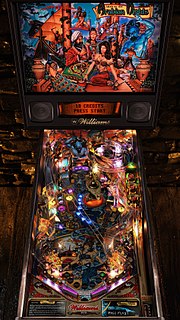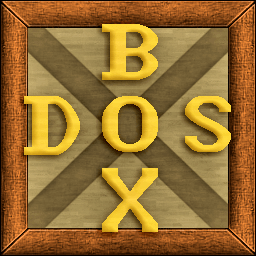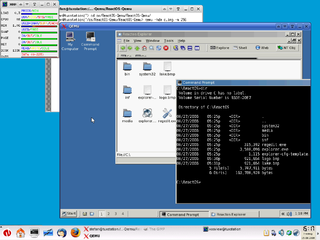
UAE is a computer emulator which emulates the hardware of Commodore International's Amiga range of computers. Released under the GNU General Public License, UAE is free software.
In computer science, dynamic recompilation is a feature of some emulators and virtual machines, where the system may recompile some part of a program during execution. By compiling during execution, the system can tailor the generated code to reflect the program's run-time environment, and potentially produce more efficient code by exploiting information that is not available to a traditional static compiler.

Visual Pinball is a freeware and source available video game engine for pinball tables and similar games such as pachinko machines. The software is composed of an editor and the simulator part itself. It runs on Microsoft Windows. The program is also able to operate with Visual PinMAME, an emulator for ROM images from real pinball machines.
UltraHLE is a discontinued emulator for the Nintendo 64. It was hailed by gamers as a massive step forward in emulation technology on its 1999 release. Emulating the N64 made it the first of the N64 emulators to run commercial titles at a playable frame rate on the hardware of the time.

DOSBox is an emulator program which emulates an IBM PC compatible computer running a DOS operating system. Many IBM PC compatible graphics and sound cards are also emulated. This means that original DOS programs are provided with an environment in which they can run correctly, even though modern computers have dropped support for the old environment.
ePSXe is a PlayStation video game console emulator for x86-based PC hardware with Microsoft Windows or Linux, as well as devices running Android. It was written by three authors, using the aliases calb, _Demo_ and Galtor. ePSXe is closed source with the exception of the application programming interface (API) for its plug-ins.

QEMU is a free and open-source emulator that performs hardware virtualization.
Virtual DOS machines (VDM) refer to a technology that allows running 16-bit/32-bit DOS and 16-bit Windows programs when there is already another operating system running and controlling the hardware.

Project64 is a Nintendo 64 emulator written in the programming language C for Microsoft Windows. This software uses a plug-in system allowing third-party groups to use their own plug-ins to implement specific components. Project64 can play Nintendo 64 games on a computer reading ROM images, either dumped from the read-only memory of a Nintendo 64 ROM cartridge or created directly on the computer as homebrew. Project64 is considered one of the top performing emulators used today and the most popular Nintendo 64 emulator. The program is licensed under the GNU General Public License version 2, and is free and open-source software.

Dolphin is a free and open-source video game console emulator for GameCube and Wii that runs on Windows, Linux, macOS, Android, and iOS.
In computer security, executable-space protection marks memory regions as non-executable, such that an attempt to execute machine code in these regions will cause an exception. It makes use of hardware features such as the NX bit, or in some cases software emulation of those features. However technologies that somehow emulate or supply an NX bit will usually impose a measurable overhead; while using a hardware-supplied NX bit imposes no measurable overhead.

PCSX2 is a free and open-source PlayStation 2 emulator for Windows, Linux, and macOS that supports a wide range of PlayStation 2 video games with a high level of compatibility and functionality. Although PCSX2 can closely mirror the original gameplay experience on the PlayStation 2, PCSX2 supports a number of improvements over gameplay on a traditional PlayStation 2, such as the ability to use custom resolutions up to 8192×8192, anti-aliasing, and texture filtering.

PCSX is a free and open-source video game console emulator which allows software designed to be used with the Sony PlayStation to run on personal computers. Over the years, development changed hands several times with PCSX-Reloaded (PCSXR) now being the main version.

Oracle VM VirtualBox is a free and open-source hosted hypervisor for x86 virtualization, developed by Oracle Corporation. Created by Innotek, it was acquired by Sun Microsystems in 2008, which was in turn acquired by Oracle in 2010.
MagiC is a third party and now open-sourced multitasking-capable TOS-compatible operating system for Atari computers, including some newer clone systems manufactured later. There are also variants that run as part of Mac and PC emulation environments, as well as on macOS Intel-Mac computers.

A video game console emulator is a type of emulator that allows a computing device to emulate a video game console's hardware and play its games on the emulating platform. More often than not, emulators carry additional features that surpass the limitations of the original hardware, such as broader controller compatibility, timescale control, greater performance, clearer quality, easier access to memory modifications, one-click cheat codes, and unlocking of gameplay features. Emulators are also a useful tool in the development process of homebrew demos and the creation of new games for older, discontinued, or more rare consoles.

In computing, an emulator is hardware or software that enables one computer system to behave like another computer system. An emulator typically enables the host system to run software or use peripheral devices designed for the guest system. Emulation refers to the ability of a computer program in an electronic device to emulate another program or device. Many printers, for example, are designed to emulate HP LaserJet printers because so much software is written for HP printers. If a non-HP printer emulates an HP printer, any software written for a real HP printer will also run in the non-HP printer emulation and produce equivalent printing. Since at least the 1990s, many video game enthusiasts have used emulators to play classic arcade games from the 1980s using the games' original 1980s machine code and data, which is interpreted by a current-era system.
Mupen64Plus, formerly named Mupen64-64bit and Mupen64-amd64, is a free and open-source, cross-platform Nintendo 64 emulator, written in the programming languages C and C++. It allows users to play Nintendo 64 games on a computer by reading ROM images, either dumped from the read-only memory of a Nintendo 64 cartridge or created directly on the computer as homebrew.

RPCS3 is a free and open-source in-development video game console emulator and debugger for the Sony PlayStation 3. It was developed in the C++ programming language and features OpenGL and Vulkan as its back-end renderers. The emulator currently runs on Windows, Linux and FreeBSD operating systems, allowing PlayStation 3 games and software to be played and debugged on a personal computer.













